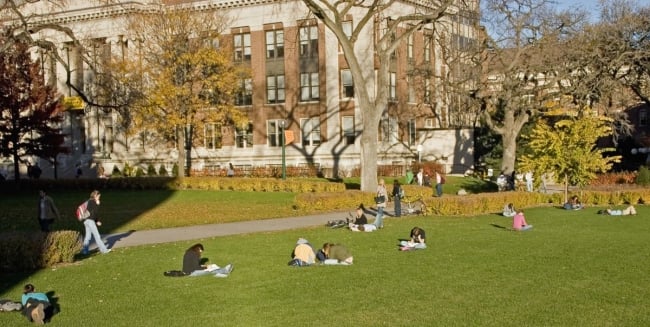You have /5 articles left.
Sign up for a free account or log in.

Getty Images
President Trump has questioned the value of community colleges and suggested universities “restrict free thought.”
Survey results in 2017 suggested that typical conservatives had increasingly begun to share the president's dim view of higher ed. In a Pew survey, only 36 percent of Republican and GOP-leaning respondents said higher education had a positive effect on the direction of the country -- a steep drop-off from responses only two years before, although the slide had begun in 2016, before the election. (NOTE: This article has been updated from an earlier version to clarify when the poll numbers began dropping.)
Results from another recent Pew survey indicate that those views have persisted. In July, only 33 percent of Republican survey respondents said higher ed had a positive effect. And 59 percent believed higher ed had a negative effect on the country’s direction, the highest number in the survey’s findings so far.
Rather than a temporary blip, the Pew findings suggest a continuing challenge for college leaders hoping to maintain or repair a bipartisan consensus in support of postsecondary education.
That Pew survey found 67 percent of Democrats and Democratic-leaning respondents had positive views of higher ed, a slight drop-off from two years prior. Over all, 50 percent of U.S. adults said they had positive views of postsecondary education.
“It is certainly something we're aware of, and we do find it troubling,” said Dan Madzelan, associate vice president for government relations at the American Council on Education. “Higher education historically has not been caught up in any kind of partisan divide.”
The factors behind the lower approval rates (higher ed had positives of 63 percent for all Americans in 2015) likely go beyond partisan attacks or controversies driven by cable news. Americans of all political persuasions have cited the rising cost of college in previous survey responses. And the elite college admissions scandal that unfolded earlier this year damaged the higher ed brand even though it involved only a handful of highly selective institutions.
The overall picture of the public’s view of higher ed is probably more complicated as well. Surveys released by D.C.-based think tanks in 2018 and this year found broad support for the value proposition of higher ed even among conservatives.
And Pew findings suggest colleges aren’t unique in their lower standing with the general public.
Views of U.S. Institutions Are Down Across the Board
The latest numbers on the partisan divide over higher ed came from a July survey of opinions on major U.S. institutions. No more than 50 percent of respondents had positive views of the impact made by entities like large financial institutions, tech firms, churches, labor unions, large corporations and the national news media.
Only unions and banks had seen significant improvement in public perception since 2010, according to the Pew results. And tech firms had seen the most precipitous drop-off in positive public opinion. Whereas 50 percent said they had a positive view of tech companies’ impact in July, 68 percent had positive perceptions of the sector in 2010. The gap in views between Republicans and Democrats on the industry was also fairly small compared to other institutions.
It’s not clear why positive views of higher ed among Democrats may have dropped off since 2015. The July survey, which polled roughly 1,500 people and had a margin of error of 4.4 percent for questions on partisan views, didn’t ask detailed questions about common concerns with colleges -- such as cost, degree value or free speech on campus.
Pew conducted the survey about four months after federal prosecutors filed indictments against dozens of individuals involved in buying their children admission into elite, highly selective colleges. The scandal stemming from that operation, dubbed Varsity Blues, fueled public cynicism of the idea that higher ed is a meritocratic system.
David Schleifer, vice president for opinion research at Public Agenda, cautioned against attaching too much significance to the apparent drop in positive views among Democrats.
“It’s not a major drop like you see when you look at the Republican side,” he said. “Let’s see where that goes over the next year.”
More Nuanced Findings on Public Perceptions
After Pew and Gallup shed light on Republicans’ increasingly negative view of higher ed, subsequent surveys have presented a more nuanced picture of public opinion. A New America report in 2018 found Republicans and Democrats agreed on the value of a degree. The sharpest divide was over who should pay for college -- the government or students themselves.
A Third Way survey released this summer found roughly 50 percent of Republicans had a favorable view of higher education, while 44 percent had negative views. The survey also found overwhelming GOP support for vocational schools and public community colleges. And both Republicans and Democrats surveyed supported accountability for low-performing institutions by large margins.
Schleifer said the kinds of questions surveys pose could affect how respondents report their views on higher ed. Individuals could have very different reasons for concluding colleges are having a positive or negative impact on the country.
“It’s important to keep in mind that that's a really different question from whether a degree is important for economic success or important for success in the workplace,” he said.




